You’re washing dishes when your kitchen faucet springs a leak. What do you do?
Learning how to fix common household problems like this is not only empowering but could also save you lots of time and money, says Beth Allen, a contractor and DIY expert in Pennsylvania. “With a little bit of knowledge, you may be able to skip calling the pros for everyday hassles,” she explains. “Plus, you’ll get the fixes done faster and more affordably.”
Here are the five of the most common problems she gets asked about.
Running Toilet
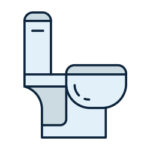 When water is continually leaking from the tank to the bowl, it’s a waste; plus, the noise can drive you crazy. A part called the flapper—the round rubber stopper, often red, that sits at the bottom of the toilet tank and is attached to the handle chain—is usually to blame. If the flapper is covered with mineral deposits or is misshapen, you’ll need to replace it, she says.
When water is continually leaking from the tank to the bowl, it’s a waste; plus, the noise can drive you crazy. A part called the flapper—the round rubber stopper, often red, that sits at the bottom of the toilet tank and is attached to the handle chain—is usually to blame. If the flapper is covered with mineral deposits or is misshapen, you’ll need to replace it, she says.
- Stop the water supply by turning the shut-off valve beside the toilet
- Flush the toilet to empty most of the tank.
- Inspect the chain to make sure it’s long enough to let the flapper close fully but not long enough to get caught under it.
- If the chain is the right length, remove the flapper by gently unsnapping it from the hinges, says Allen, and take it to a home center to buy a replacement that’s the same size and shape.
- “Pop the new one on, connect the chain to the handle, turn the water back on, and flush!” Allen says.
Leaky Faucet
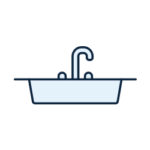 “Most faucets have a metal or plastic cartridge inside the base of the handle,” says Allen. “Over time, these can rust out from mineral buildup or just break with age.” If you see water leaking from the handle onto the sink top, or if a faucet doesn’t turn off completely, you’ll likely need to replace the cartridge.
“Most faucets have a metal or plastic cartridge inside the base of the handle,” says Allen. “Over time, these can rust out from mineral buildup or just break with age.” If you see water leaking from the handle onto the sink top, or if a faucet doesn’t turn off completely, you’ll likely need to replace the cartridge.
- Determine the make and style of the faucet to buy the proper replacement cartridge.
- Shut off the valves under the sink. Remove the decorative cap and screw, then the faucet handle, to expose the cartridge.
- With an adjustable wrench or socket set, unscrew and remove the cartridge.
- “Now you’ve got an empty hole,” says Allen. “With a toothbrush and a little bit of vinegar, scrub away any mineral deposits. Then put a paper towel in and clean out the well,” she says. “This way, you know that when you put the new cartridge in, it will fit snugly.”
Clogged Drain
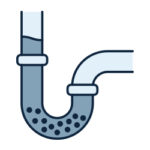 When sinks and tubs drain slowly or back up, something’s in the way. When that happens, Allen recommends spending a couple of bucks on a drain-cleaning tool from the hardware store. It looks like a thin plastic twig dotted with barbs, and you just snake it down the drain. “I love this thing,” she says. “It‘ll pull up all the clumps of hair and gunk that build up in the pipes.”
When sinks and tubs drain slowly or back up, something’s in the way. When that happens, Allen recommends spending a couple of bucks on a drain-cleaning tool from the hardware store. It looks like a thin plastic twig dotted with barbs, and you just snake it down the drain. “I love this thing,” she says. “It‘ll pull up all the clumps of hair and gunk that build up in the pipes.”
- For a tub or sink that has a drain screen, you may have to unscrew it to insert the stick.
- For a pop-up drain, you can usually pass the tool around it.
- After using the tool, pour a cup of baking soda down the drain, suggests Allen, followed by a cup of vinegar.
- Close the drain and allow the cocktail of ingredients to fizz for 10 minutes.
- Pour a kettle of boiling water down the drain. “This disinfects, deodorizes and cleans your drain without any toxins,” Allen says. “Plus, it’s cheap!”
Hole In Drywall
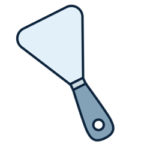 If the hole is smaller than a green pea, it’s easy to fix with spackling paste.
If the hole is smaller than a green pea, it’s easy to fix with spackling paste.
- Sand the area of the wall half an inch around the hole with smooth-grit or drywall sandpaper.
- Apply a layer of spackling paste with a spackle blade held at a 45-degree angle to the wall, swiping from top to bottom and left to right until the area is smooth and even, says Allen.
- Allow it to dry completely for two to three hours. “The biggest mistake people make is not letting it dry. If you’re impatient, use a hair dryer set on medium heat, slowly passing it over the patch,” Allen says. (High heat will cause cracks.)
- Be sure to prime the area before painting it with the color topcoat. “Paint dries differently on fresh spackle than it does on a primed wall, so you’ll have a blemish if you forget to prime,” she says.
- Finally, use a mini-roller to apply the topcoat. “If you brush paint on, it almost always looks different than the rest of the wall,” Allen advises.
Replacing A Door Lock
 Whether you’ve just moved into a new place or want to swap out your existing knobs, tackling a lock change doesn’t have to be difficult, says Allen.
Whether you’ve just moved into a new place or want to swap out your existing knobs, tackling a lock change doesn’t have to be difficult, says Allen.
- To begin, remove the screws that are holding the knob in the door and pull it out—one section from each side.
- Near the latch, remove the screws along the edge of the door. Here you’ll find the locking mechanism; pull it out.
- Check to see if the new lock holes line it up cleanly with the edge of the door. “If not, you may need to chisel out a space so the latch sits flush against the surface,” says Allen.
- Put in the new mechanism from the skinny side of the door, says Allen, and tighten the screws. “It’s like making a sandwich,” she explains. “Knob, mechanism, knob.”
- On the doorframe, inspect the latch plate before removing, suggests Allen, as you may be able to get away with keeping the same one in place. “You don’t have to change the plate if the color and shape are similar, but you won’t know until you try to shut the door,” she says.
- You can keep the hinges, says Allen, or brush them with metal enamel paint if they’re a different color.
By Patrick Rogers
What’s even easier than unclogging a drain? Calling the GEICO Insurance Agency for a free quote on homeowners insurance or renters insurance.
Read More: How To Build Your First Tool Kit

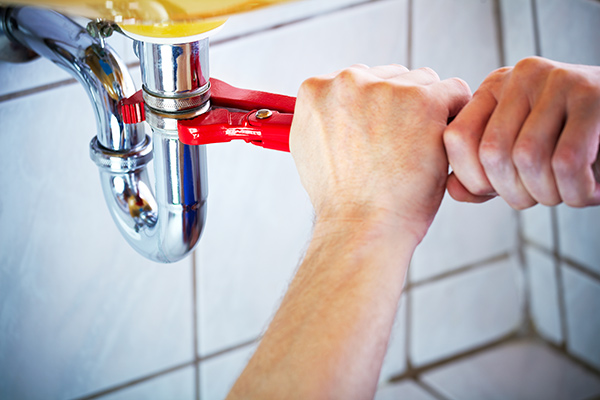




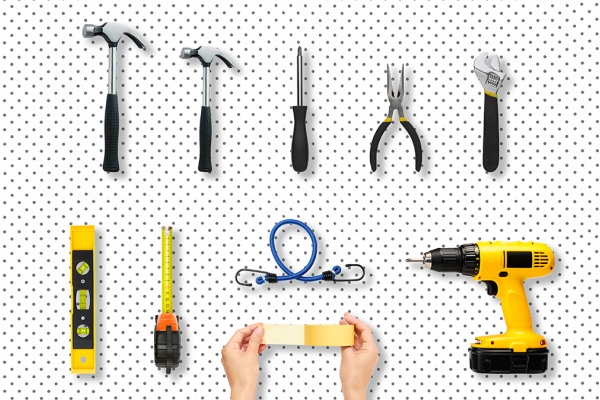



Esther says,
Thanks for all the valuable information
janet franza says,
Great useful Tips. Keep them coming!
Jerrie Pratt says,
The draining tool can be purchased also at Wal-Mart for less then $5.00 near the bathroom hardwear.
Rosie says,
Thank you for the tips! They are really appreciated!
Karen Hardy says,
Thanks for the tip on the drain clog. I will look for the tool.
T.Aguilar says,
Thank you for tips!
Anne Werth says,
I appreciate all of the positive tips! It’s ?great to have a partnership with a company that values it’s customers
and helps them with useful money saving tools!?
Donna abeyta says,
Good stuff!!
1)Where can I ask or get other do it yourself tips, like replacing fluorescent lights and the electrical component.
2) cleaning tool for clogged drain: what does it look like?
Thanks, so much, send me more tips!
Denise E says,
The item to unclog the drain is about 18 in long with spiked edges along the stick. When you go to the hardware store ask for plastic disposable snake for the drain and they know they’ll know exactly what you need.
m. malik says,
Where to get this tool
Thienngoc says,
Thank you for your kind sharing
Riche seizeme says,
Thanks for advice
Ann says,
Very useful information..thanks
Marie Whytsell says,
I am an elderly, single female homeowner trying to live on a budget. I really appreciate these easy instructions and hope that you will send more. Is there a tool that can help add a little muscle to unscrewing tight knobs?
I have my car inspected as required by law and have the oil changed as recommended. Are there other things that I should check?
Thank you,
Kirsty says,
That was fan information I have learnt another thing today ☺
E says,
When replacing the cartridges in your faucet handles, check the make and model number. I’ve been surprised that some models have lifetime warranty. After jumping through some hoops to locate an 8-year old receipt, I got some free parts from American Standard!
Diwan ehsan says,
Lovely